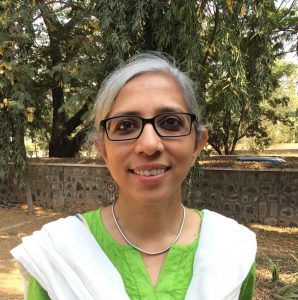Sagari Ramdas, a veterinarian and educator in India, tells of her activism to help Indian farmers regain control of lands, agricultural and food systems they believe their country’s agrarian reforms have damaged. AJWS believes her approach upholds the tenets of climate justice, the deep connection between environmental issues like climate change and human rights, politics, ethics and poverty. This concept is a major guiding principle in our land and water rights and climate justice portfolio—and the incredible organizations we support around the world.
Food sovereignty—people’s right to define their own food and agricultural systems—can be a matter of life and death.

In fact, Sagari Ramdas told AJWS, “every seven minutes in India, there’s a farmer committing suicide. [And] this is not happening in a vacuum.”
Indeed, the country is in the midst of an agrarian and food crisis that has caused widespread despair in rural communities, according to Sagari, who works with several grassroots organizations, including a partner of AJWS. She says farmers in India, particularly small and marginal peasant farmers, are struggling to make a living.
Their current struggle is just one consequence of a long, complex history of unjust and incomplete land reforms, problematic global trade agreements, and policies that have favored the growth of industrial food production. For instance, in the mid-1990s, India joined the World Trade Organization (WTO) and rolled out a series of economic reforms that ended direct subsidies to farmers, reduced import duties on foreign food and farm products, and slashed public finances for agriculture.
Trickle-down effect on farmers
As a result, Sagari said, Indians started buying cheaper produce from other countries, leading many farmers to abandon their profession, sell their land for cheap, and move to cities in search of jobs, which are increasingly harder to come by.
Tragically, it has also contributed to an alarming number of farmers deciding to end their own lives, often using the very chemicals peddled to them by corporations.
“When you’re in huge debt, there reaches a point where the farmer says, ‘I can’t do anything else and the only thing for me to do is take my life,’” Sagari said. About 300,000 farmers have committed suicide in the last two decades—with an estimated 6,000 to 7,000 in 2015 alone. “It’s just getting worse. It’s like an institutional murder of farmers.”
The effects haven’t stopped there.
“Farmers have increasingly moved away from producing food,” Sagari said, naming cotton, sugar cane, animal feed and energy feed as examples of their new, more lucrative, crops. They have also switched from planting diverse fields to growing just one or two crops—a method that has caused a proliferation in the use of chemical fertilizers and pesticides, as well as the use and sale of GMO seeds.
“The impact of that on the land has been dreadful,” she said. Indeed, the practice of monocropping—growing only one type of crop year after year on the same land—degrades the health and quality of soil, has been linked to declines in crop yield, leaves crops vulnerable to disease, destroys biodiversity and increases climate vulnerability. All of these interconnected phenomena exacerbate the drain on farmers’ livelihoods.
Land rights for indigenous people
Sagari is a veterinary scientist, aspiring agroecological farmer, popular speaker and educator on social movements, and member of the Food Sovereignty Alliance1 in India. The alliance aims to “take back control” of lands, agricultural and food systems and local markets that India’s farmers believe have been wrested from them as a result of various domestic policy decisions.
Sagari and her fellow land rights activists argue that the government’s trade and farming policies violate rights enshrined in India’s constitution. “It’s not about changing laws,” she continued. “We have got constitutional protections. We want to make those protections work [to] prevent further damage.”
Sagari illustrates this with the example of protections to India’s indigenous people, also known as adivasis. In 2006, after more than a century of struggle by indigenous communities, the Forest Rights Act was created to reverse a historic injustice, restore communities’ rights to protect their forests and veto development projects that threatened forests in their territories.
But even this progress is in question.
“Several legislations made in the last 20 years are a double-edged sword,” Sagari explained. “They can either work to advance capitalist growth—or if you’re smart and you’re aware of what your politics are, then you can use them to protect yourselves. That’s where the forest rights legislation rests.”
Sagari believes that for lasting change to occur, the battle needs to include every citizen—particularly those who have historically been excluded from the political process, like the landless, small and marginal farmers, dalits2, indigenous people and women.
The power of the people
“Change can happen only when we as communities actually organize for that change,” she said. “We organize where we are, right from the field, in our villages, in our local markets, and also engage with our political representatives. It is about making them hear that we are not going to take business as usual. We are not just going to keep our voices silent when the government goes ahead and signs into various trade agreements which are going to further destroy our capacities.”
Female roles are critical: “They are anchoring this entire relationship of their families, of their communities,” she said. “They’ve been doing this for generations [in] communities that are linked to the land. There is a whole body of knowledge that comes from the fact that for thousands of years, you’ve lived with land, you’ve lived with forests, you’ve grown food, you’ve reared animals, you’ve understood and observed medicinal plants, you’ve saved seeds.
“Women have been very key,” she continued, “in the sustaining of the knowledge, in the practice of that knowledge, in being able to relate to the landscape around them, what to do, what not to do, to discover new knowledge systems, to constantly be innovating.”
Furthermore, the movement for agrarian reform must include not just the producers of food, “but consumers of that food. We are active agents of change and we are co-creating a new way of living.”
And she asserts that “we need to raise questions about how development even works”—examining how local and global leaders seek to generate economic growth and whether those solutions are helping or hurting local indigenous people and small peasant farmers.
“If we continue just accepting the given framework of development, in fact many and much of the sustainable development goals may not be reached,” Sagari told AJWS. “A lot of what is happening in the name of development today is in fact deepening discrimination, deepening patriarchal relations, deepening violence against women, especially for young girls and young women, making them more vulnerable.”
Sagari believes that rebuilding relationships between communities and nature is key. She wants to direct the conversation toward “communities taking back control and using their agency to define what kind of world they want to live in.”
[1] The Food Sovereignty Alliance joins the social movements of adivasi, dalit, pastoralists, fisherfolk, and small and marginal farmers, along with their allies, to work toward a common vision of food sovereignty and social justice in defense of sovereign rights to food, the rights of mother earth and those of future generations.
[2] “Dalit,” meaning “oppressed,” is the self-chosen political identity of historically discriminated communities, deemed to be outside and at the bottom of India’s highly oppressive and racist caste system.
AJWS’s work in countries and communities changes over time, responding to the evolving needs of partner organizations and the people they serve. To learn where AJWS is supporting activists and social justice movements today, please see Where We Work.

